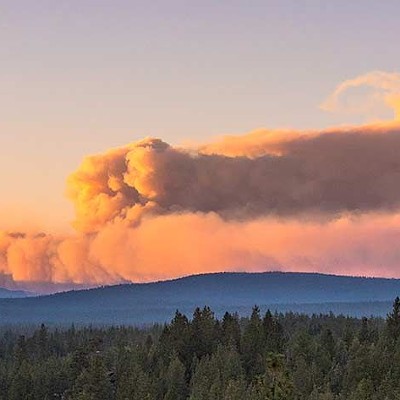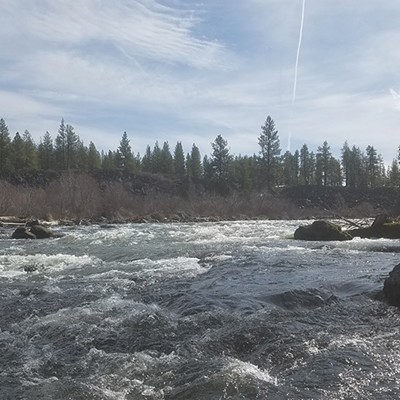COUGARS AND DEER
I'd like to address the recent cougar shootings in town. It seems that very little effort is being put toward the cause and too much into the symptom.
Bend has a deer problem. I routinely have deer in my yard (I live on the west side of town near downtown). They never seem to leave town. Deer are also one of the main food staples of cougars.
I think it's high time we start removing the deer. They have begun raising their young in the city, and soon there will be generations of deer that haven't learned to live in the wild because they're too busy helping themselves to lawn vegetation and handouts from residents. During the fawn rearing season, deer can also be very protective and deadly to little kids and our domesticated animals (one look on YouTube can show you why).
Let's get serious. If we really care about the cougar problem, we need to start with their food source. Simply put, a city is no place for a wild animal as large as a deer.
—Matt Skeels
IN REPLY TO "LETTER: SAVE SOME WATER FOR THE FISH" (5/13)
The Dead Fish Society's letter repeats Landwatch's claim that the Tumalo Creek flow will be drastically diminished in the future. This was the conclusion presented in the report, "Climate Change Impacts on Stream Flow." The report was a joint effort by personnel of Northwest Land & Water, Water Professionals Network (WNP), and Mark Yinger Associates. The specific claim is that climate change will reduce the precipitation needed to recharge the regional aquifer. As a result, the June Tumalo Creek flow is estimated to decrease by 69 percent in 2039 and by 86 percent in 2060.
A close reading of the report, however, uncovers a fatal analysis flaw. The analysts used the 2008 groundwater recharge estimate throughout the study interval (2008-2060). But 2008 was a particularly dry year. In the 30 years prior to 2008, the estimated annual recharge value fell below the 2008 value only twice. The low recharge estimate for 2008 is consistent with the Bend rainfall total in 2008, which was just 6.5 inches, 55 percent of normal. The analysts' use of the low recharge value throughout the 53-year study interval rendered their analysis and conclusions invalid.
There is a deeper question about this report. Let's assume that it was commissioned to provide results that could influence public policy. There is convincing evidence, however, that the report contains a significant error. Did that error occur due to an analytical blunder or was the low recharge value used intentionally to produce a desired result? It is not clear which it might be. One of the report authors is a Washington State licensed professional geologist and another is an Oregon State registered professional geologist. State licensed professionals have an ethical duty to provide their clients with unbiased analysis. It would be interesting to see if that ethical requirement has been followed.
—Jared Black
IN REPLY TO "LETTER: A HOME BUILDER'S TAKE ON AFFORDABLE HOUSING" (5/13)
I find it not surprising that a builder would say "No one is satisfied now with smaller homes" and more comments against small homes. I bought a new 900 square foot, two bedroom, one car garage home last year, as did three others in our little group. Many other people expressed interest, however, the builder has now gone on to build larger homes. Yes, they would (and do) sell—it is the builders who are not wanting to build them. I suspect their profit is much better on larger homes, hence the lack of desire to build them! There has been much interest in recent years in tiny homes—much smaller than mine—if you build it, they will come!
—Sally Slick
UGB AND BPRD
One of the major arguments for enlarging the Bend Urban Growth Boundary (UGB) and for Bend Parks and Recreation to forgo the System Development Charges (SDC) for affordable housing developers is that Bend is currently facing a housing crisis; however, before turning Bend into another Phoenix, Arizona, or povertizing BPRD, maybe it is worthwhile to understand how we arrived at this situation in the first place.
An article in the May 21 Wall Street Journal, titled "Luxury-Building Focus Adds to Rent Squeeze," noted that "of 370,000 multifamily rental units completed from 2012 to 2014 in 54 US metropolitan areas, 82 percent were in the luxury category." As Susan Wachter, professor of real estate at the Wharton School of the University of Pennsylvania explains, "I don't believe there ever has been a time where we have produced so much luxury housing."
Clearly, builders have gone where the money is; however, their present cry for needed land and civic handouts in order to build low income housing smacks of the boy who, after killing his parents, asked the court for mercy since he is an orphan.
In addition, the rent squeeze is a problem not just for low-income workers, but more and more, also an issue for middle class families and individuals. In response, cities such as Atlanta, Georgia (according to the Wall Street Journal), are "considering a mandatory requirement that developers of new housing help create units deemed affordable... Individuals who are considered to be middle class...school teachers, city employees and bank tellers need housing subsidy as well."
I suspect BPRD's directors will support giving up some SDC funds; they tend to be both empathetic and problem solvers. I think, though, that these directors need to remember their primary mission. I believe Bend's parks and trails have figured predominantly in the city's recent resurgence. I also believe that many overestimate BPRD's resources. Through successful bond elections, public and private partnerships and grants, and frugal accounting, BPRD has accomplished much. Still, a perfect storm of pressure to increase salaries, especially for lower paid staff, of higher PERS costs, and of higher health insurance expenses awaits. Should BPRD choose to forgo SDC's for low cost housing I urge them to touch only SDC funds which would result in less money for trails, parks, etc. Tapping its general funds in any way, I believe, is too financially dangerous.
—Bob Almquist
























